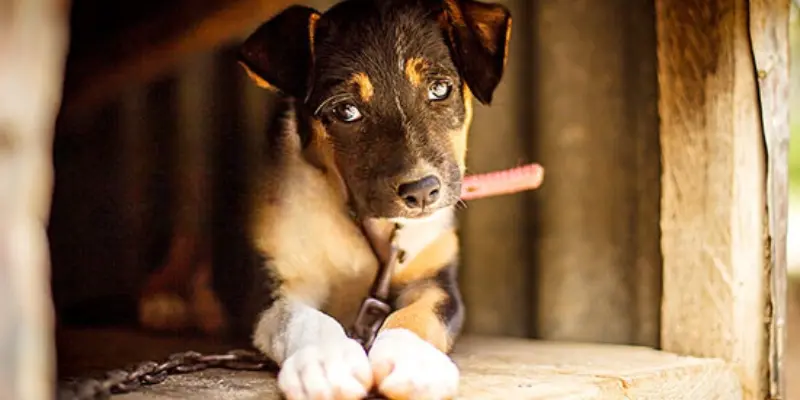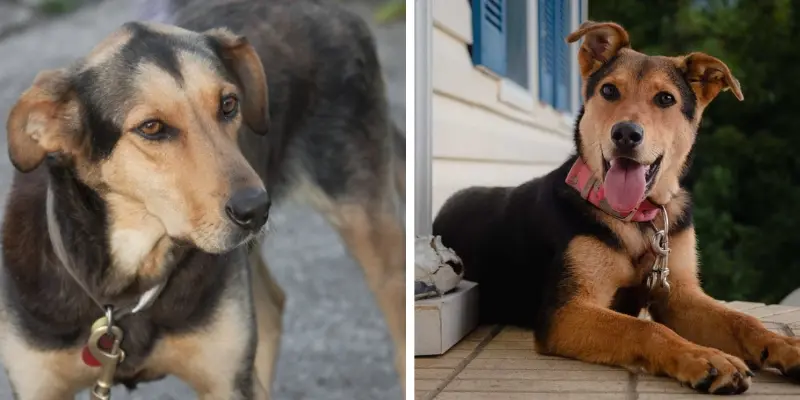5-Mistakes in New Zealand Huntaway Dog Training You Sould Not Make—Learn Practical Tips
Published: 01 Jan 2025
The New Zealand Huntaway dog is a unique and hardworking breed, famous for its loud bark and impressive herding skills. Originally bred to manage large flocks of sheep across the rugged New Zealand terrain, these dogs are full of energy and intelligence. If you’re lucky enough to have a Huntaway puppy, early training is key to shaping them into a well-behaved companion.
By avoiding these training mistakes, you can guide your dog toward balanced behavior and a happy life. Ready to bring out the best in your furry friend?
Let’s dive in!…

Understanding the New Zealand Huntaway Dog
The New Zealand Huntaway dog is not your typical herding breed. Unlike other sheepdogs that rely on silent movements and eye contact, Huntaways are known for their loud bark, which helps them drive sheep across vast distances. This unique trait makes them highly effective in the open farmlands.
Energetic and Intelligent
Huntaways are full of energy and always ready for action. They thrive on physical activity and mental challenges. If they don’t get enough exercise, they can become restless and develop unwanted behaviors.
Strong Herding Instincts
Even as puppies, Huntaways may show signs of their natural herding instincts, such as chasing or barking. Understanding and managing this behavior early is essential to ensure it doesn’t turn into bad habits at home.
Highly Vocal Nature
Barking is natural for a Huntaway and part of what makes them excellent working dogs. However, without proper training, this can lead to excessive barking. It’s important to teach them when it’s appropriate to bark and when to stay quiet.
Common Mistakes to Avoid in Huntaway Dog Training
| 5-Common Mistakes |
|---|
Training a Huntaway dog can be challenging, but avoiding common mistakes can make the process smoother: 1 –Inconsistent Training: Stick to the same commands and rules consistently to avoid confusing your dog. 2 –Neglecting Energy Needs: Huntaways are high-energy dogs. Make sure they get enough exercise to prevent anxiety and bad behaviors. 3 –Ignoring Barking: Letting your dog bark freely can create bad habits. Train them with commands like “quiet” to control barking. 4 –Lack of Mental Stimulation: Provide mental challenges, such as puzzle toys and obedience training, to keep them engaged and avoid boredom. 5 –Not Addressing Herding Instincts: Redirect their natural herding instincts early on to avoid problematic behavior. |
Early Training for Huntaway Puppies

Training your Huntaway puppy early helps build good behavior and strengthens your bond. Here are key steps to guide you:
- Socialization:
- Introduce your puppy to new environments, people, and dogs.
- Start in calm places and gradually move to busier areas to build confidence.
- Teach Basic Commands:
- Focus on simple commands like “sit,” “stay,” “come,” and “quiet.”
- Reward good behavior with treats or praise for faster learning.
- Leash Training:
- Train your puppy to walk calmly on a leash without pulling.
- Gently correct pulling and reward them for walking by your side.
- Keep Sessions Short:
- Limit training sessions to 5-10 minutes to match their short attention span.
- Make sessions fun and positive to keep them engaged.
Advanced Huntaway Dog Training
Herding Commands
Once your Huntaway puppy has mastered basic commands, start teaching herding-specific commands like “go,” “stop,” and “come back.” Use both verbal cues and hand signals to give your dog clear directions. Practicing in open spaces will simulate real herding situations and help them respond effectively.
Mental and Physical Stimulation
As an active dog, Huntaway requires both mental and physical exercises. Provide puzzle toys and scent games to challenge their minds. Regular physical activities like walks, fetch, and runs will keep their energy levels in balance and prevent boredom.
Consistency and Patience
Advanced training takes time, so remain patient and consistent. Reinforce commands regularly, and always use positive reinforcement. With continued practice, your New Zealand Huntaway dog will become a well-trained and balanced companion.
Tips for Managing Barking
One of the standout traits of the New Zealand Huntaway dog is its loud and frequent barking. While barking is an essential part of their herding instincts, managing it effectively is key to maintaining a peaceful home environment. Here are some tips to help you control excessive barking:
Understand the Cause of Barking
Huntaways bark to communicate, especially when they’re working or feeling excited. Before trying to control their barking, understand why they’re doing it. Are they bored? Excited? Or simply trying to get attention? Identifying the cause can help you address the root of the behavior.
Training the “Quiet” Command
Teach your dog the “quiet” command early on. When they start barking, say “quiet” in a calm but firm voice. Wait for a moment of silence and reward them with praise or a treat. This reinforces that being quiet leads to a reward, encouraging them to stop barking on command.
Avoid Encouraging Excessive Barking
Be mindful not to accidentally encourage barking by giving attention when they are loud. If you respond to your dog when they’re barking for attention, they may learn that barking gets them what they want. Instead, only give attention when they’re calm or when you feel that the barking is for some real reason.
Provide Enough Physical and Mental Stimulation
Huntaways are high-energy dogs that need both physical and mental exercise. Make sure they get plenty of playtime, walks, and challenging activities to keep them occupied. A tired dog is less likely to bark out of boredom.
By understanding why your Huntaway barks and using consistent training methods, you can help reduce unnecessary barking and enjoy more peaceful moments with your dog.
Keeping Your Huntaway Dog Happy and Healthy

A happy and healthy Huntaway dog is one that receives both physical and mental stimulation. Because Huntaways are energetic and intelligent, they require a balanced routine to stay content and well-behaved. Here are some important tips to ensure your dog remains in top condition:
Regular Exercise
Huntaways are active dogs, so they need plenty of exercise to burn off their energy. Regular walks, runs, and playtime are essential. Try to engage them in activities like fetch or agility training that keep them physically fit and mentally challenged. Aim for at least an hour of exercise a day, depending on their age and fitness level.
Mental Stimulation
Because of their high intelligence, Huntaways thrive on mental challenges. Offer them puzzle toys, scent games, or obedience training sessions to keep their minds sharp. These activities prevent boredom and help prevent destructive behavior.
Proper Diet
Feeding your Huntaway a balanced diet is key to their overall health. Look for high-quality dog food that meets their energy needs. You may want to consult with your vet to ensure you’re giving them the right amount of food, especially as they grow from a puppy into an adult dog.
Routine Vet Check-ups
Regular vet visits are important for maintaining your dog’s health. Keep up with vaccinations, flea and tick treatments, and check-ups to ensure they stay healthy. Regular dental care and grooming should also be part of their routine.
Tail End Thoughts
Training a New Zealand Huntaway dog requires patience, consistency, and an understanding of their unique traits. Early socialization and basic commands with advanced herding training and managing their barking each step plays a vital role in shaping a well-behaved and happy dog.
By providing enough physical exercise, mental stimulation, and clear boundaries, you help your Huntaway puppy grow into a balanced companion. Remember to stay consistent with your training, address their energy needs, and guide them in managing their herding instincts.
With the right approach, your Huntaway dog can be a joyful, well-trained, and loyal member of your family for years to come.





